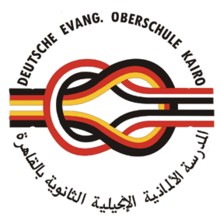Deutsche Evangelische Oberschule
| DEO Kairo Deutsche Evangelische Oberschule Kario (DEO) | |
|---|---|
 | |
| Location | |
| Dokki, Cairo | |
| Coordinates | 30°1′56.44″N 31°12′38.87″E / 30.0323444°N 31.2107972°E |
| Information | |
| School type | Private |
| Religious affiliation(s) | Teaches Islam/Christianity |
| Founded | 1873 |
| Status | Open |
| Principal | Thomas Schröder-Klementa |
| Teaching staff | 120[1] |
| Number of students | 1,400 (2010)[1] |
| Classes | 1-12 |
| Average class size | 25 |
| Education system | German/Arabic |
| Language | German/Arabic/English/French |
| School color(s) | None |
| Newspaper | DeoLino: 1-4, "The Voice" and "Die Schülerzeitung": 5-12 |
| School fees | 30,000LE or 3123EUR |
| Revenue | Unknown |
Deutsche Evangelische Oberschule (DEO; Arabic: المدرسة الألمانیة الإنجیلیة الثانویة بالقاهرة) is an exclusive German school in Dokki, Giza, Egypt, in the Cairo metropolitan area.[2] It is operated by the German Protestant community of Cairo.
History
The initiative for a school was established by the Protestant congregation of Cairo. The school was built along with a rectory in the spring of 1873 on land given to the Prussian consul von Theremin by the Khedive Ismail. The language of instruction was French with 15 students attending. On February 2, 1878, there was a dispute about the school’s ownership between the church and the school, which resulted in the school’s becoming community owned and adding optional Arabic lessons. In 1880, the school further expanded to include 89 students in three classes. There were students of different nationalities with 28 Turks, 19 Egyptians, ten Italians, five Germans, five Swiss, five French, four Syrians, three English, three Scots, three Levantines and one each Austrian, Greek, Persian and Armenian. The school had students of different religions: 41 Muslim students, 19 Protestant, 14 Roman Catholic, seven Jewish, seven Coptic and one Greek Orthodox. After the English conquered Egypt in 1882, English courses were added to the school’s curriculum. In 1908, the school was relocated to Boulaq with primary and secondary education facilities. A year later, their first "Einjährigenexamen" (a German secondary education exam) was made before the German examination committee.[3]
Due to the First World War, students stopped going to school and by November 1914 the school was shut down. In 1920, England liquidated all the German properties including the community properties in Egypt. On February 17, 1930, the school was reopened with five students attending. In July 1933, the school was relocated to its old location. By 1939, the school had 13 classes with 130 students, but had to be closed again due to the start of the Second World War.[3]
On January 12, 1953, the school was reopened with 18 students attending and the addition of a newly established kindergarten. The first director of the school was Artur Hachmeister. The school was than moved to Dr.-Mahmoud-Azmi-Straße 2 in Zamalek. The first "Reifeprüfung" (high school exam) was done by three female and three male students. On October 1, 1956, an Islam course was added to the school’s curriculum which was required by the Egyptian government as of June 26, 1956. In 1957, Arabic was made a compulsory course for all students attending the school. The graduates of the school were eligible to attend Egyptian universities by January 1958. In 1959, the school’s first Arabic division director, Auni Abder Rauf, was appointed. On March 1, 1977, the school was relocated to Dokki. In 2001, the school added a new course called "koeducative" religion for Muslim and Christian students.[3]
Traditions
Every year, a sports competition between the DEO and the Deutsche Schule Athen (DSA) takes place. The schools compete in the following sports: Swimming, Track and field and either basketball, football or volleyball. Every year, one school flies to the country of the other for this event.
Other traditions include the Christmas bazaar, the Klaus-Heller-Lauf and the annual "Brotaktion", where food and supplies are gathered for the homeless and sent to charity. The Deutsche Evangelische Oberschule also organizes an annual "Pyramidenlauf", which is an event at the Pyramids of Giza every February where students, teachers and others run for 8 kilometers. The start and finish line is located at the third pyramid of Menkaure. The marathon has been an annual event since 1976.
The DEO also takes part in the annual "Jugend musiziert" competition held between German schools around the area of the Mediterranean Sea.
Notable graduates
- Michael Bochow, sociologist
- Samih Sawiris, entrepreneur
- Naguib Sawiris, entrepreneur
- Nassef Sawiris, entreupeneur
- Mohamed El-Sawy, engineer, politician
- Amr Hamzawy, political scientist, politician, publicist
Notable visitors
- On March 22, 1974, Germany's Chancellor Willy Brandt visited the school.[3]
- On February 27, 1978, Germany's Chancellor Helmut Schmidt visited the school.[3]
- In 1981, Egyptian president Anwar Sadat and his wife Jehan Sadat visited the school.[3]
- In October 1984, Germany's President Richard von Weizsäcker visited the school.[3]
- On February 22, 2000, Germany's President Johannes Rau visited the school.[3]
References
- 1 2 Wolters, Christiane (2008-07-04). "Mit Marken-Sneakers im Pulverfass" (in German). Frankfurter Rundschau. Retrieved 2009-01-26.
- ↑ "Kontakt." Deutsche Evangelische Oberschule. Retrieved on 18 January 2015. "6, El Dokki St. Dokki / Giza"
- 1 2 3 4 5 6 7 8 "DEO Kairo: Geschichte" (in German). DEO Kairo. 2007-11-01. Retrieved 2009-01-26.